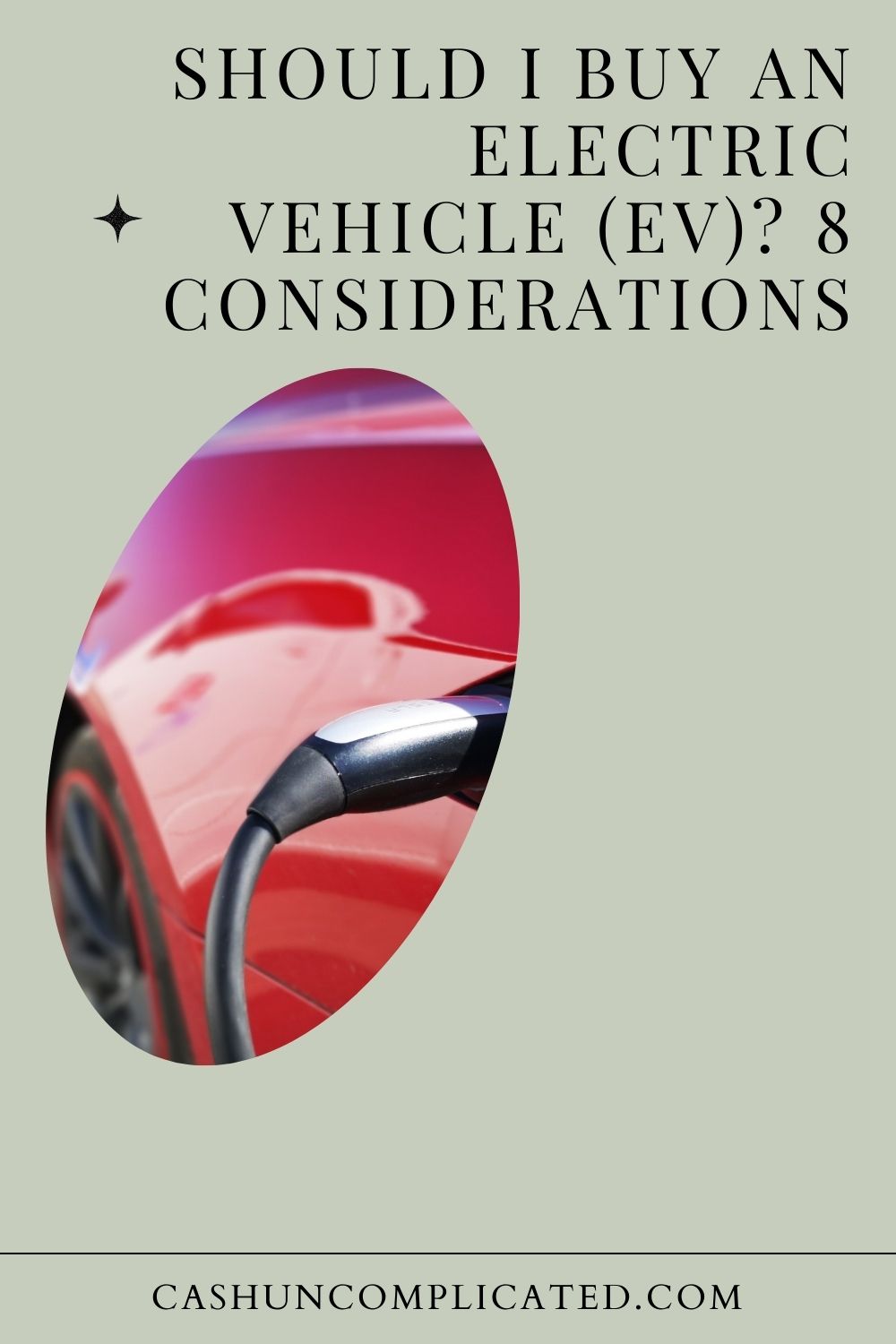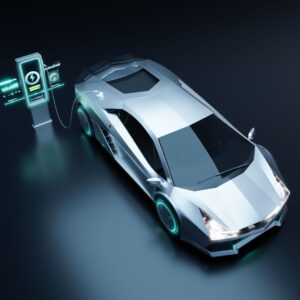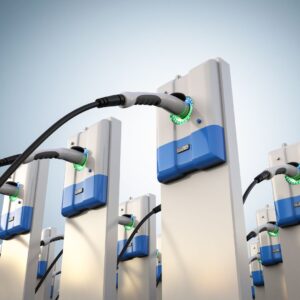Should I buy an electric vehicle (EV)? With the increased number of electric vehicles on the road, this is a question that is coming up more and more.
It used to be Tesla and a couple other companies were the only electric vehicle manufacturers. There weren’t a lot of choices in the space. Now there are several car manufacturers making electric vehicles with more and more adding new lines every year.
What is an EV?
An EV is short for electric vehicle. It’s any vehicle powered by a re-chargeable battery. EV’s require no gas.
Is a Plug in Hybrid the Same as an Electric Vehicle?
A plug in hybrid is close, but not the same as an electric vehicle. A plug in hybrid uses electricity to charge the battery, but still has a gasoline option when needed. Many people like the plug in hybrid because it allows them to fill the car with gas when needed and use electricity all other times.
They are much more fuel efficient than regular gasoline vehicles and offer a nice in-between for those wanting greater fuel efficiency, but not ready to make the full switch to electric.
Recommended Post from Edmunds: Hybrid vs. Electric vs. Plug In: What Are They & How Are They Different?
Why Are People Buying EV’s?
The two biggest reasons people are buying EV’s are to reduce energy costs and environmental concerns. Many choose EV’s for both benefits. There are probably some outlier reasons but those are the two main ones for the majority of people.
If the infrastructure is set up (charging station, solar on house, etc.), EV’s can save hundreds of dollars per month in fuel costs alone. Those cost reductions can really help the average person with their monthly budget.
Types of EV’s
There are many different types of EV’s. Sedans and coupes are very popular as are SUV’s. You can also buy a truck/other larger vehicle, and I’m even starting to see school and city buses powered by electricity. As the technology improves, more and more options are becoming available.
Things to Think About
These are some things to think about before you buy an electric vehicle. It’s not a one-size-fits all as there are many variables such as charging stations, home set-up, etc.
Number 1: What Are the Benefits to an EV?
If you’re going to buy an expensive car like an EV, there needs to be some major benefits to the purchase. The first benefit that comes to mind is the cost of ownership.
EV’s allow you to completely eliminate gasoline. Gas fluctuates in price and within the last couple years reached into over seven dollars a gallon in certain states.
As long as you have an ability to charge the car at a reasonable price, there is a significant savings over gas powered vehicles. Without a good charging station, EV’s can actually end up costing more than gasoline powered vehicles, so watch out.
The second major benefit is impact on environment. EV’s are much cleaner and don’t require gas and oil like gas powered vehicles. Which means they also can’t leak gas and oil or burn fuel at a high rate.
Number 2: Is an EV for Me?
If you’re deciding whether to buy an electric vehicle, it’s important to ask yourself if an EV is for you. First and foremost, do you like the product? Is it something that would be useful and that you’d enjoy?
You also have to ask practical questions such as if you can afford the cost of getting rid of your old vehicle and putting the capital into an EV. Not everyone can, or wants to do this.
Related: Stop Feeling Guilty About Spending Money! The How To
Number 3: How Am I Going to Charge the EV?
You can have the best EV in the world, but if you have no place to charge it, you’ve got a problem. Most major cities have charging stations but they can be expensive if that’s your primary way of charging the vehicle.
The ideal setup is one where you can charge from home with inexpensive electricity. Houses with solar panels for example have the infrastructure already set up to produce the needed energy at a reasonable cost. Houses in states with low electricity costs are also great.
Many apartment complexes, hotels, and jobsites are providing charging stations where people can charge their vehicle. Many of these aren’t free though so keep an eye on the cost or you might end up paying more than gas.
Number 4: What are the Savings?
Since one of the primary reasons for buying an EV is for the savings, it’s important to know your numbers.
Example one is someone living in a home with solar panels who spends $35,000 on an EV. Suppose it costs $50 per month to charge their EV at home as opposed to $300 per month on average to fill up with gasoline. That’s a savings of $250 per month and $3,000 per year.
You also have to factor in cost of the solar panels, any insurance increases or decreases, cost to install a charging station, etc. It’s also important to factor in gasoline prices as they fluctuate because that may increase or decrease your returns.
Number 5: How Long Do I Need One Charge to Last?
Depending on what kind of work you do and/or lifestyle you live, you’ll need your charge to last a certain number of miles. For example, someone who drives an average of 30 miles per day won’t even need to charge everyday if their EV holds a charge for 200 plus miles.
Someone who makes sales calls in territories far from their home a couple times per week would have different requirements or have to charge mid-trip multiple days per week. So before purchasing an EV, know your numbers and your requirements.
Number 6: What are the Hidden Costs?
When deciding whether to buy an electric vehicle, you have to look at more than just the cost of the EV. There are hidden costs you have to be aware of. For example:
- Increased vehicle registration and insurance costs if the EV is more expensive than your existing car
- Setup costs to installing a charging station at your house
- Increased energy costs, especially if you don’t have solar
- Cost to add additional solar panels to your house to support EV charging
For example, I currently drive an old car. It’s been a great car and has been incredibly reliable.
When I decide to move on to an EV (which is coming soon), my insurance costs will go up as will vehicle registration. This is in addition to the cost to add more solar panels and add a charging station at my house.
Number 7: How About My Old Car? What Should I Do With It?
How old is your current vehicle? If it’s only a few years old, do you really want to jump into an EV now or wait a few years until your car begins to deteriorate and the EV technology gets even better?
In many cases, it probably makes sense to keep your old car a little longer because of those reasons. If you do decide to make the move to an EV, you’ll want to maximize the sale price of your current vehicle to help offset the cost of the new car.
So will you sell it on the private market or choose the convenience of a dealership/used car app and pay a premium for the convenience? You’ll want to make all these decisions before buying the newer car as it impacts your upfront costs for the EV.
Number 8: What are the Intangibles?
We’ve already addressed the reasons most people choose to buy an EV, but now it’s about you. What are some of the intangibles an EV can offer you? There are a lot of other reasons to want an EV, such as:
- It’s faster and handles better than your current car
- You’re in sales and want to present yourself in a certain image
- You just like the way it feels to drive and own
Think about the intangibles the car offers you and decide if it’s worth the price. The intangibles might put the car over the top for you, or the lack of might push you towards keeping your car for another couple years.
Conclusion
The decision to buy an electric vehicle is a big one. Cars are one of the larger purchases the average person makes in their lifetime so thought and care should be put into the decision.
Making a good decision that might actually save you money from your current car situation can help move your personal finances to a higher level. Where making a less than optimal decision like buying an EV with outrageously high payments will put you in a tough financial spot.
Do you own an EV? If not, would you consider buying one?








